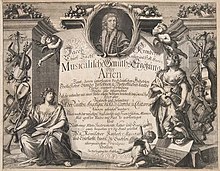Jakob Kremberg
Jakob Kremberg (also Jacob , Cremberg , James Cranbrook ) * around 1650 in Warsaw ; † September 20, 1715 in London was a composer , lutenist and librettist .
Life
Kremberg enrolled at the University of Leipzig in 1672 and became a chamber musician with the monastery administrator in Magdeburg in 1677 , before he worked for the Royal Swedish Chapel in Stockholm in 1678.
Afterwards he worked as an alto at the electoral court in Dresden from 1682 to 1691 . There he received an annual salary of 300 thalers under Vice Kapellmeister Nicolaus Adam Strungk . From 1693 he directed the Hamburg Opera at Gänsemarkt together with Johann Sigismund Kusser and wrote there in 1694 a. a. the libretto to Georg Bronner's opera Venus or the winning love . Later he fell out there with Kusser and secretly left Hamburg at the beginning of 1695, leaving behind large debts.
He later worked for two years at the University of Leiden , where he set a poem by Herman Boerhaave to music and probably taught John Clerk of Penicuik .
He is then on record as the organizer of a series of concerts from November 24, 1697 in the Hickford's Dancing School (Hickford's Long Room) in London .
An advertisement in the Post-Boy announced on November 20, 1697:
" These are to give Notice to all Lovers of Musick, and the Art of Singing, that Mr. James Kremberg is lately come out of Italy and shall keep a new Consort of Musick by very great Masters, of all sorts of Instruments; with fine singing in Italian, French, Englissh, Spanish, German, Dutch and Latin after the newest Italian and French Manner at Mr. Hickfort's Dancing School in Panton-Street ... This Consort will beginning on Wednesday the 24th of this instant at Eight a Clock in the Night and will continue Weekly the same day, always with New Compositions. Price Half a Crown. "
Boerhaave writes in a letter dated February 9, 1698 that Kremberg had a group of fine musicians in London who were praised for their performances of pieces. From 1702 he worked in Scotland as music master for the children of Lady Grisell Baillie of Mellerstain House in Berwickshire . He finally received an English court post in April 1706. On September 23, 1715, three days after his death, he was replaced by James Moore. He was buried in St. Anne's Church in Soho .
His wife Dorothea Sophia survived him; his son's children (three daughters and a son, who was also called James Kremberg) were baptized between 1715 and 1722 in St. Andrew's Church in Holborn .
Kremberg is one of the few composers who has written works for Angélique , a plucked instrument from the Baroque period with 16 strings.
plant
- Contemplation of the world (Ade O worldliness!), 4 voices, bc (Dresden, 1687).
- Musical delights of the mind, or arias, including their backed high German poems, some of high class people and excellent people, some of them own invention. Which are set up so that you can sing with one voice alone alongside the general bass, or at the same time and especially on the Lauthe, Angelique, Viola di Gamba, and Chitarra, can be played. Everything made in the latest Italian and French manner with great effort and diligence, and according to one instrument of nature and properties, placed in the hand quite comfortably , Dresden, 1689.
- A collection of easy and familiar aires , 1710.
- England's Glory (masque), for Queen Anne's birthday , (London, 1706), Music lost.
- A Collection of Easy and Familiar Aires , (London, 1707), fragment.
- A New-Framed Entertainment.
- 4 songs: Aurelia has sweet pleasing charms; Farewell ye gilded follies; Lavinia has majestic charms; Since I have seen Lucinda's charms .
- Setting of a poem by H. Boerhaave , 1696/7, lost.
- Concert , harpsichord, 3 voices, optional bc.
Recordings
- German Lute Songs , Naxos (HNH International Ltd.), 2002, No. 8.555935, (Track No. 5 - Oh, I love and must keep quiet and No. 13 - I'm in love with a dream ).
literature
- Max Friedlaender: The German Song in the 18th Century , JG Cotta'sche Buchhandlung Nachhaben, Stuttgart and Berlin, 1902.
- M. Tilmouth: A Calendar of References to Music in Newspapers, London and the Provinces (1660-1719) , Royal Musical Association, London, 1961.
- D. Johnson: Music and Society in Lowland Scotland in the Eighteenth Century , Oxford University Press, London, 1972.
- P. Davidson: Leo Scotiae Irritatus: Herman Boerhaave and John Clerk of Penicuik in 'Barfoot and Todd: The Great Emporium: the Low Countries as a Cultural Crossroads in the Renaissance and the Eighteenth Century ', Rodopi, Amsterdam and Atlanta, 1992, p . 166ff.
Web links
- Kremberg's biography on www.oxfordmusiconline.com
- Krembergs Lied für Lute I am in love with a dream on youtube.com
Individual evidence
- ^ Moritz Fürstenau: On the history of music and theater at the court of Dresden , Volume 1, Dresden, p. 309.
- ↑ Contributions to Musicology, Volumes 13-14. New Music, Berlin 1971, p. 50.
- Jump up ↑ Philip H. Highfill, Kalman A. Burnim, Edward A. Langhans: A Biographical Dictionary of Actors, Actresses, Musicians, Dances, and Other Sage Personnel in London 1660-1800 , Volume 7, Southern Illinois University Press, Carbondale and Edwardsville, 1982, p. 285
- ↑ Peter Holman: Life After Death: The Viola Da Gamba in Britain from Purcell to Dolmetsch , The Boydell Press, Woodbridge, 2010, p. 85.
| personal data | |
|---|---|
| SURNAME | Kremberg, Jakob |
| ALTERNATIVE NAMES | Cranbrook, James |
| BRIEF DESCRIPTION | German composer |
| DATE OF BIRTH | around 1650 |
| PLACE OF BIRTH | Warsaw |
| DATE OF DEATH | September 20, 1715 |
| Place of death | London |

